THE 1970s 2: DIRECTOR RICHARD DONNER
1970s P2
This is the second interview from the 1970s. At his peak, Richard Donner, director of Superman The Movie and the Lethal Weapon series, was one of Hollywood’s most commercially successful directors. His breakthrough film was The Omen and it was at the time of that film’s release that I interviewed him. I had seen The Omen at an audience packed preview screening a few days earlier. Frankly, I detested the movie (and still do). Not only did I think that it was shamefully manipulative but also–regarding the direction–boring. I felt that many of the non-action sequences had absolutely no life to them and were merely perfunctory Consequently, I couldn’t wait to meet the director and tell him exactly how I felt.
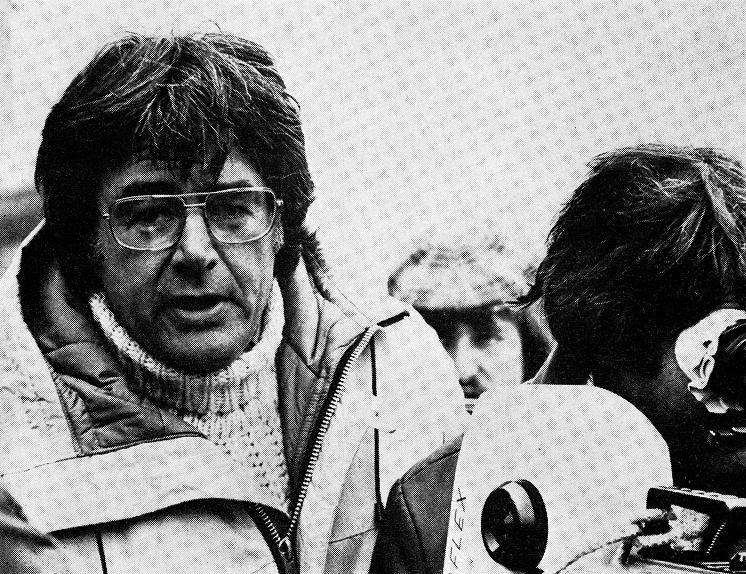
Director Richard Donner
EGAN-It says in the press bio that you grew up in the Bronx. Where about?
DONNER—Near White Plains Road in the 240s.
EGAN—You’re not going to believe this. In fact, I don’t believe it. I grew up on 225th and then when we moved to Yonkers on Bronx River Road it was right across from the 241st Bridge next to the Bronx River.
DONNER—No way. When I was a kid I used to ride my bic across that bridge all the time and along the river. That’s where the rich kids lived.
EGAN—Well, I was one of those kids and I’m telling you, I wasn’t rich. How do you like that? Holy shit! We grew up in the same place 20 years apart. How’s that for co-incidence. We’re both Bronx boys and here we are together doing an interview 1000 miles away from where we grew up.
DONNER—What can I say. Life’s full of surprises.
EGAN—OK, let’s get to business. How much control did the studio have over the film?
DONNER—None. Hate It or live it, it’s mine.
EGAN—I hated it, Now try and tell me why it’s good.
DONNER—I don’t have to defend it. It defends itself. In its first 17 days it made 17 million dollars. That’s a million dollars a day. The repeat business is frightening. Watching it were you scared?
EGAN—No, I laughed.
DONNER—Yea, man, what do you expect, you’re from the Bronx. We both laughed.
EGAN—Wait a minute. It is effective with audiences but it’s techniques are obvious. It’s so ‘predictable Hollywood.’ Actors are placed on set. “Read your lines,” then onto the next scene.
DONNER—Honestly over 90 percent of the reviews from the most critical people said Gregory Peck and Lee Remick gave the best performances in their lives.
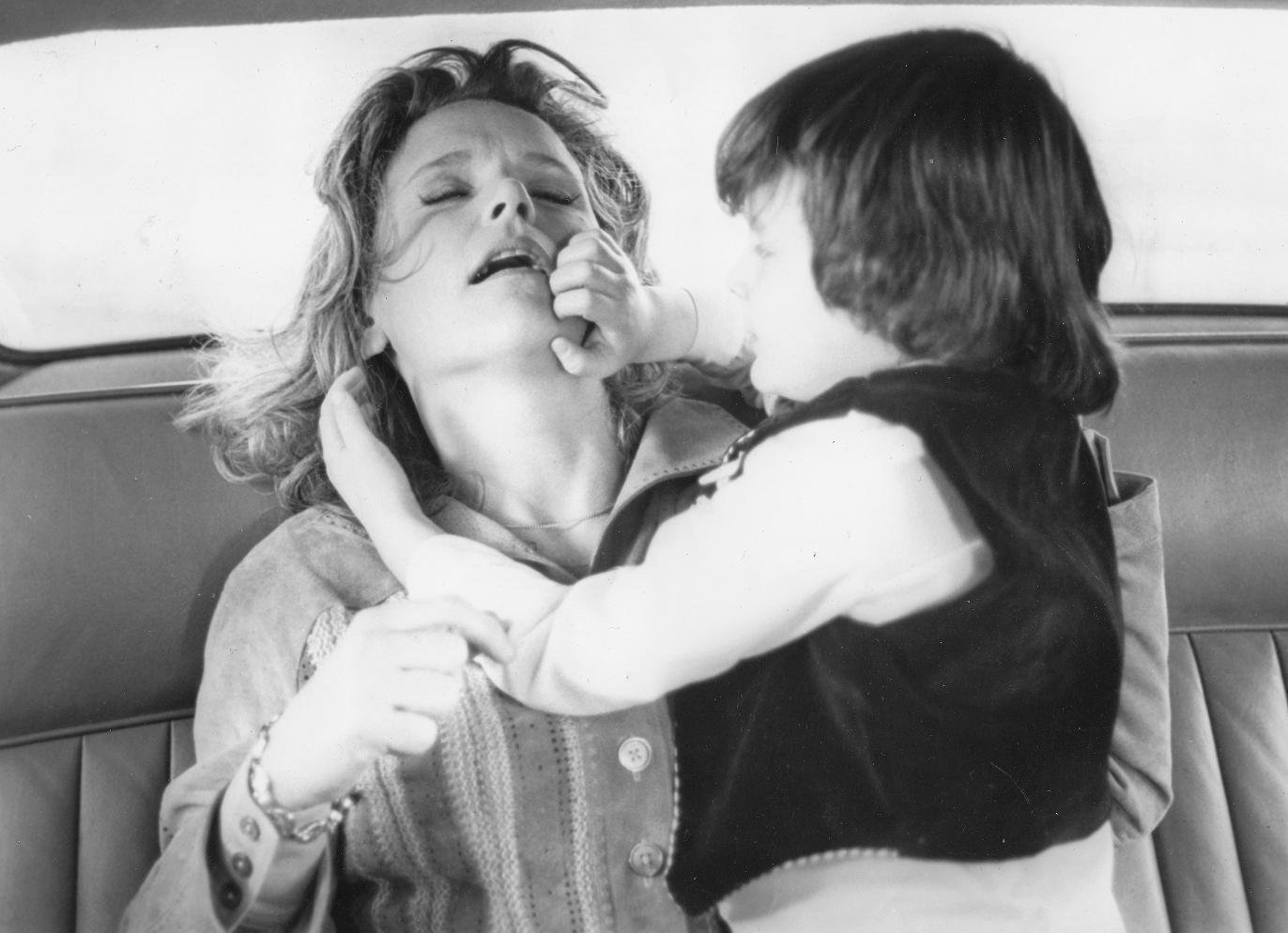
Lee Remick In The Omen
EGAN—Well obviously they haven’t seen TO KILL A MOCKINGBIRD or WILD RIVER. I didn’t think it was the actor’s fault; I thought it was just lazy directing.
DONNER—What you’re saying in a way is very much I what I did. I really went out of my way for total simplicity. It’s a piece of pure entertainment.
EGAN—I hated it and I hated it because I thought the script and story were dynamite. Seeing it, I kept saying “It’s the director’s fault this isn’t working. He can’t handle the actors; he isn’t exploring what he has with the film.
DONNER—For Example?
EGAN—OK; that scene where they’re walking by the lake with the baby. I wanted to puke. It just looked like the director didn’t know how to direct it. It was just a nothing scene.
DONNER—Hey, what’s wrong with showing a man with his wife and baby walking together and enjoying the day. I just wanted to show a family enjoying a day together.
EGAN—OK, Just look at what Nichloas Roag did with that fuck scene in DON’T LOOK Now. It told us their whole relationship.”
DONNER—Yes, it Was great.
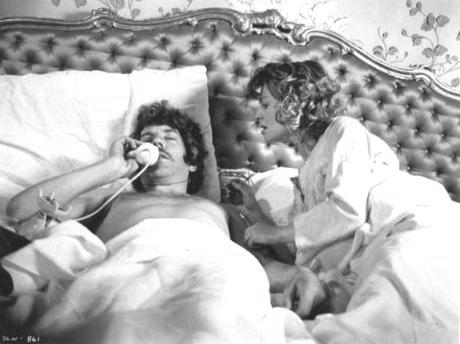
Donald Sutherland And Julie Christie In Don’t Look Now
EGAN—But there was nothing in your film like that, nothing that let us into who they were.
DONNER—Wait a minute. There are pictures and there are pictures. Pictures are made for intent. Roag is a brilliant director. He is one of my favorite directors. But, DON’T LOOK NOW has grossed maybe–if it was lucky—in the world market 6 million. That film lost money. I made a picture for the public to go and see and they’re flocking to it.
EGAN—To be honest with you watching your film I didn’t think it was going to make a dime. People at the preview were scared, but then they laughed. I thought it was because they saw how contrived it was.
DONNER—The only time there was laughter, and I’ve seen this picture 40 times before it was released and every day since, is when it’s self conscious. It builds to a point where people have to laugh.
EGAN—OK, you’ve made a fine piece of manipulation. That doesn’t necessarily mean it’s a good film.
DONNER—But what’s film making? Every film has its intent. What about Alfred Hitchcock. He is considered one of the greatest directors ever and his films are all about manipulation. He has it all worked out how to manipulate an audience before he even shoots a foot of film.
EGAN—OK, I love Doris Day, Rock Hudson movies. They’re brilliant. Take LOVER COME BACK. In dealing with the advertizing business it was showing much of what is part of human nature. The delightful weakness we humans have. Those films are able to entertain and they’re able to be something more. But your film is nothing but manipulation.
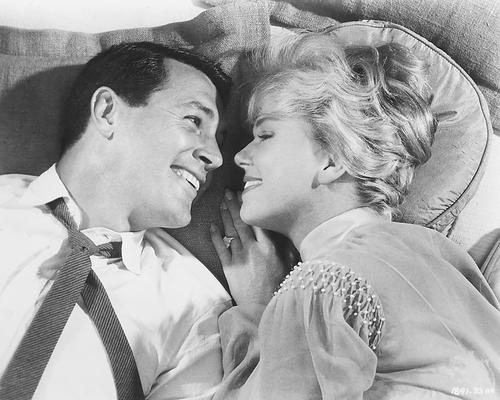
Rock Hudson And Doris Day In Pillow Talk
DONNER—But wasn’t PILLOW TALK manipulation. It was about male chauvinism before it got to be called that. The film got you to agree with it.
EGAN—I know it did but in portraying it, it was also commenting on it. If you look at the films carefully they give a full picture…(I let out a deep breath and literally deflate) ….Ah hell with it. I could be totally wrong about THE OMEN. In 20 years, you’ll make a bunch of films and in that perspective this may be a considered great movie. You just never know, really. You were talking about Hitchcock. Well, just look at VERTIGO. When it first opened everyone thought it was a flop. Now many influential critics consider it one of the greatest films ever made. So, what do I know?
DONNER—Listen, I love you telling me you don’t like it. I’ve been going all over the country hearing how beautiful it is and how wonderful it is and how fantastic and what a genius I am. Then to all of a sudden I run into a cat who sees it another way.
EGAN—How did you get involved?
DONNER—I got hold of the script, read it and loved it. It was about to the dropped at one of the studios and I gave it to Alan Ladd Jr. production head at Fox and he read and called me and said, let’s make it at Fox. So, I called the producer and told him I sold it to Fox and that we were making the picture. The producer then called Ladd and said he had a director for the film and Ladd told him outright “Richard Donner is the director or we don’t make the movie” and that was that. I was directing the movie.
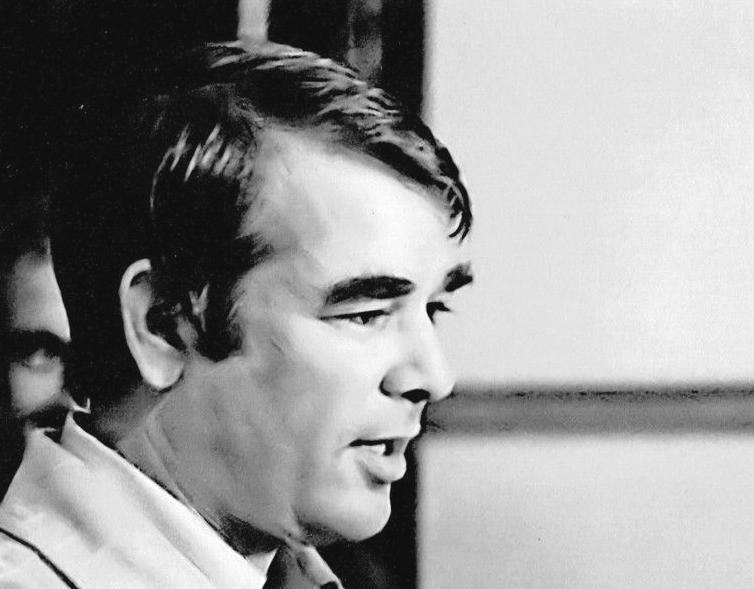
Alan Ladd Jr.
DONNER—What did you think about the music?
EGAN—It was fantastic. About the only thing I liked in the movie. It really pumped up the scare factor. Jerry Goldsmith is fantastic. I’ve loved his stuff since THE BLUE MAX and THE SANDPEBBLES. I can even hum the main theme from THE BLUE MAX. He’s a genius.
DONNER—Everyone’s wild about the music. The Album’s already out and it’s selling big time.
EGAN—Believe it or not, I’m probably going to buy it. I buy all his records. How did you get Peck involved?
DONNER—We spoke to a lot of actors they were interested and then had questions. His agent sent him the script and pushed it. He liked it, we met at Peck’s house and he listened to what I wanted to do with the movie I don’t consider it a horror film but a mystery suspense film. Is this all real, or have we driven this character insane and perhaps it’s all n his head. Peck said he liked this approach and he signed on.
EGAN—Were you intimidated working with him?
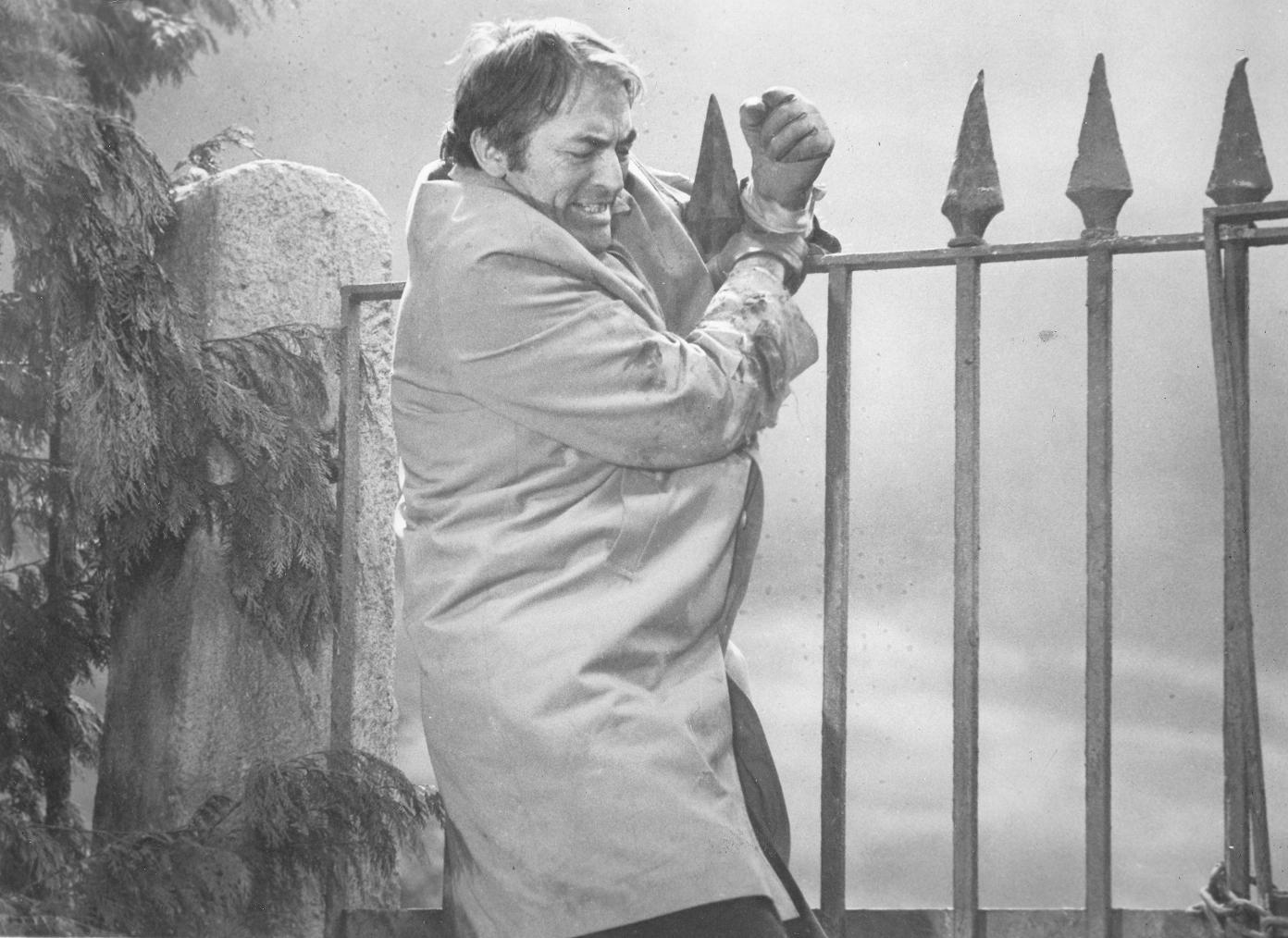
Gregory Peck In The Omen
DONNER—In the beginning but once we started working together he was an actor and I was the director and that pretty much was it. Greg’s a serious guy.
EGAN—Any Arguments?
DONNER—We only disagreed about one scene. It was a terrible argument but Peck told me that I was the director and so he would do it my way. After he saw what I did with it he was a big enough man to tell me I was right. He was a delight to work with; a total professional.
EGAN—Lee Remick?
DONNER—Same thing.
EGAN—How much did it cost?
DONNER—Under three million. We started at $2,400,000 and came in at $2,800,000 and already made that back the first five days. Everything that comes after that is profit.
EGAN—Maybe that’s why everyone is calling you a genius…. Frankly, I just thought it was a lazy job of directing.
DONNER—Most difficult job I’ve ever had in my life.
EGAN—Yea, but what did you do before this—TV. I rest my case.
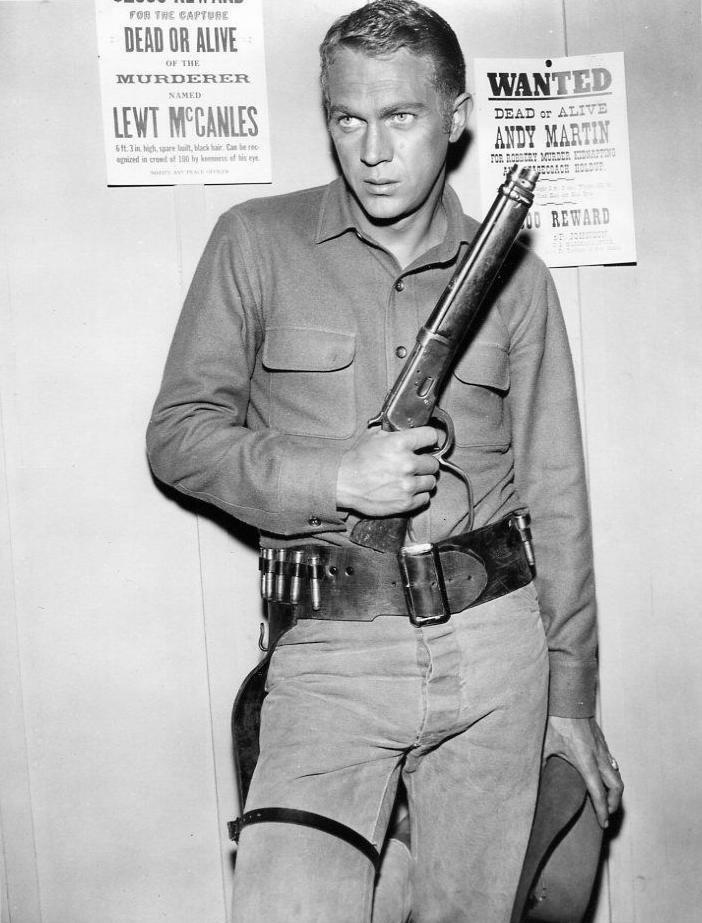
Steve McQueen In Wanted Dead Or Alive
DONNER—Hey listen, I started some of the best shows on TV. I did the pilots for WANTED DEAD OR ALIVE, MAN FROM UNCLE, GILLIGAN’S ISLAND, GET SMART.
EGAN—Why did you go into features?
DONNER—You always go into features. You look for the opportunity. I wasn’t in it strictly for the money at that point. A twelve day picture was offered to me with Charles Bronson. A dramatic documentary on the x-15 called X-15. It made a fortune.
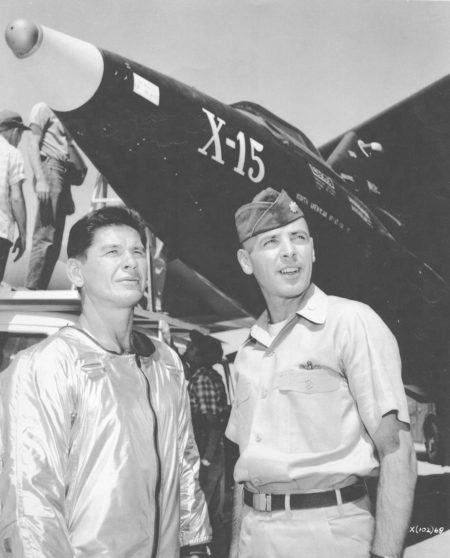
Charles Bronson in X-15
EGAN—I saw that one when I was a kid. Next film?
DONNER—SALT AND PEPPER with Peter Lawford and Sammy Davis. I was fired from the cutting and Sammy and Peter did it. What I did I loved, but I’ve never seen their film.
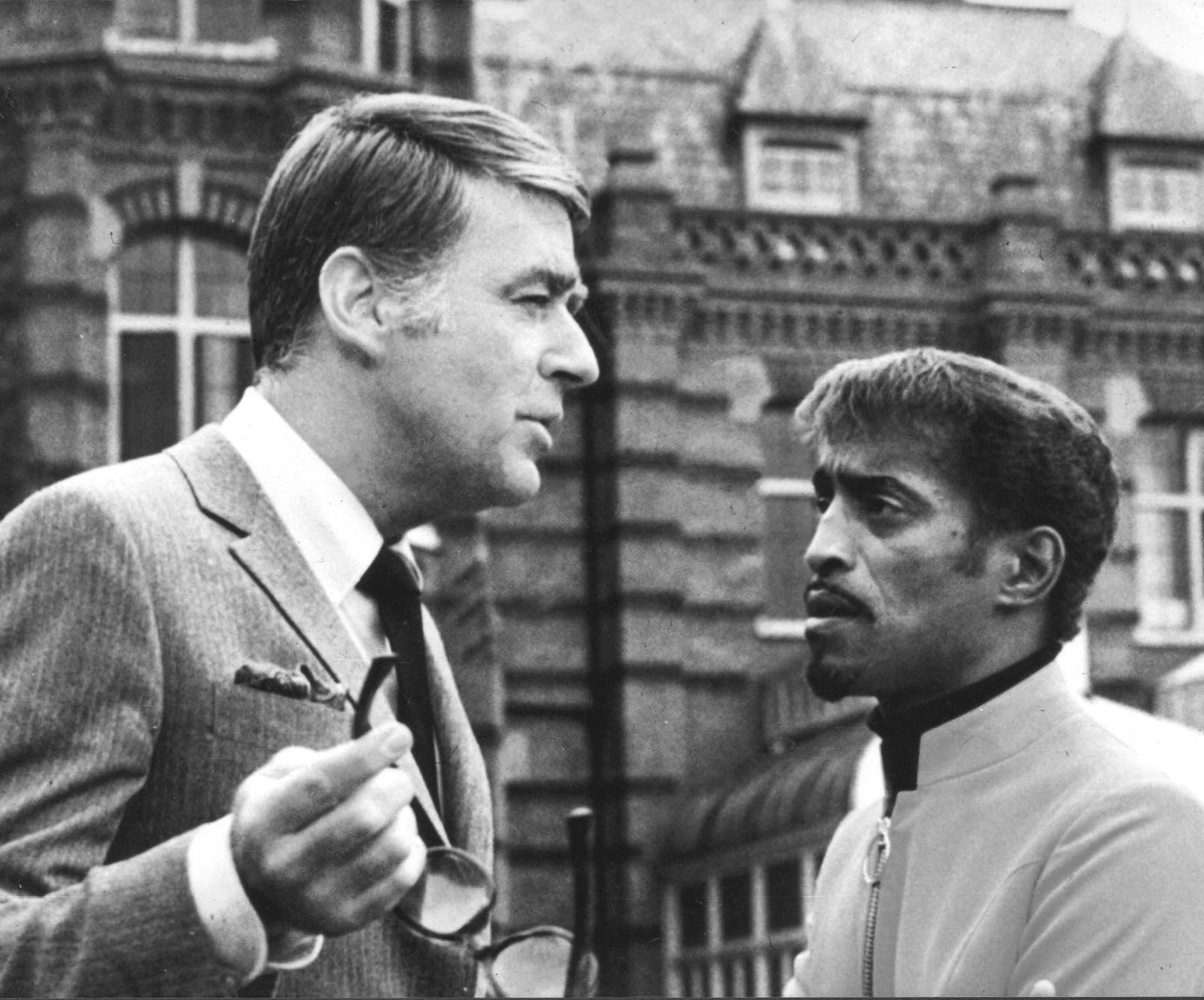
Peter Lawford and Sammy Davis In Salt And Pepper
EGAN—Why were you fired?
DONNER—I was trying to make a simple Abbott and Costello kind of wonderful thing and they wanted to do the problems in a black and white relationship. Anyway what I did was good enough so they got a sequel out of it.
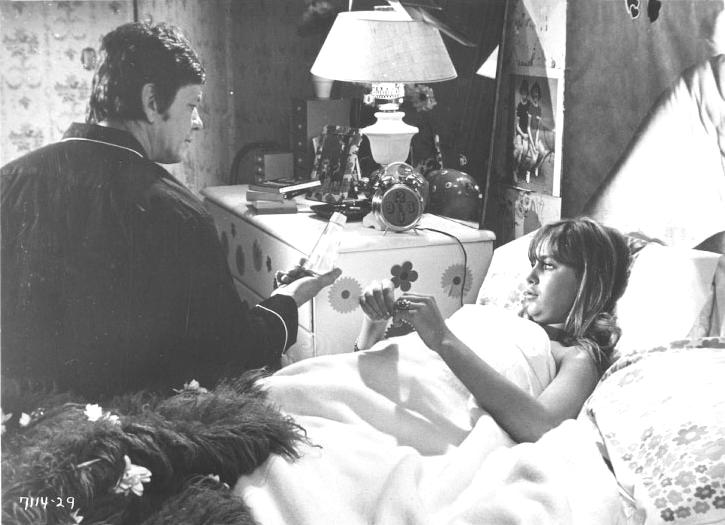
Charles Bronson And Susan George In Lola (Twinky)
EGAN—After that?
DONNER—A picture called TWINKY with Charlie Bronson, Susan George, Trevor Howard, Robert Morley, Jack Hawkins and Honor Blackman. Made in England. It was a wonderful, silly little romantic comedy. The producer sold it to AIP. AIP brought it over here and re-cut, re-edited and re-dubbed it. They then added two scenes and called it LOLA and made it more of a sex thing.
EGAN—How did that make you feel.
DONNER—Like shit.
EGAN—This is why Hitchcock and Ford cut in the camera. No one can change what they did.
DONNER—Well, there’s a yes and no to that. You can’t change how a scene plays but you can still take stuff out. Everything Hitchcock shot in FRENZY didn’t make it into the film. Gil Taylor; he shot The Omen also shot FRENZY and told me about all the stuff that wasn’t used.
EGAN—So, how did you get control over THE OMEN with all that had happened to you in the past?
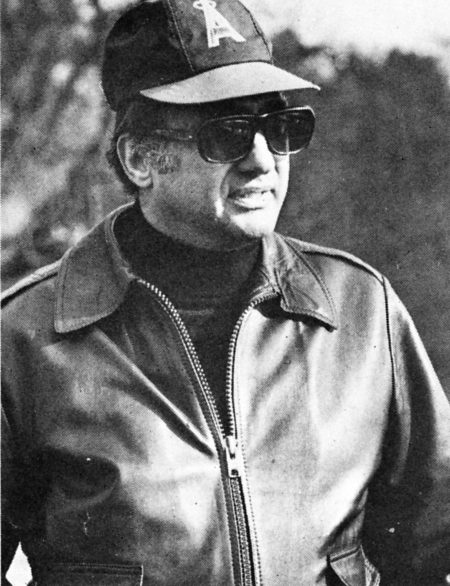
Producer Harvey Bernard
DONNER—I had a producer who was fantastic. Harvey Bernard. He backed me to the hilt and went up to the wall for me. Alan Ladd Jr.; the head of Fox, I have to say is the best guy I ever worked with in my life. If he had a suggestion he never made it a demand. He hit you with a question. It really provoked a thought and you said, “Hey, sensational!” They both were fantastic.
EGAN—Now you’re “hot” as the industry phrase goes.
DONNER—Right. The Hottest!
EGAN—How does it feel?
DONNER—Sensational….Everyone wants to have a meeting with me now.
EGAN—That must be a new experience.
DONNER—The other night I had dinner with Barbara Streisand and Jon Peters.
Egan—I met them in Phoenix on a Junket. She is something else.
DONNER— We’re eating dinner and she asks me what sign I am and I roll my eyes and tell her, “Oh come!” I don’t believe in any of that junk and gave her my opinion of what I think about astrology and she says to me, “OK, OK. Stop with the Jewish Defense League already.” I started laughing and I fell in love with her.
EGAN—Why did they want to meet with you?
DONNER—They’re thinking of me possibly directing they’re next movie.
EGAN—Guess, that happens when you’re hot. Now that you are this hot are you scared?
DONNER—No, I’m going to enjoy life. I’m going to follow this picture all the way through. I’m taking the film to Europe next and I’m going to supervise the selling. I’m a guy who’s got to work. So, I know probably October, I’ll be into another film.
EGAN—Looking at films……..Am I beginning to bum you out.
DONNER—No, not at all. What the hell am I going to be bummed out on?
EGAN—I’m putting you down by putting your film down.
DONNER—You can’t put me down. I’ve been like this for a lot of years. People have griped me all my life. The only thing I’ve got to defend is me to myself. Life is very uncomplicated for me. I dig getting up in the morning. I’m alive. I’m well and I love life and nobody’s going to ruin it for me.
EGAN—How Long did it take you before you got your act together?
DONNER—About an hour.
EGAN—(I laughed) Come on. You got away from mommy and daddy and then the insecurities began.
DONNER—Listen, really, I had incredible parents. I love them.
EGAN—Then Why are you creative?
DONNER—I honest to God don’t know.
EGAN—Ever been to Analysis?
DONNER—I went through analysis.
DONNER—What did they tell you?
EGAN—They didn’t tell me anything. I answered my own questions. I really found out about myself. I was amazed.
EGAN—Why did you go into it?
DONNER—I was involved in a situation that was hurting me.
EGAN—It wasn’t the totality of your life, then?
DONNER—No, it was a moment which was going to evolve into the totality of my life if I didn’t handle it properly. I had no answers.
EGAN—I talk to myself in the mirror all the time. It helps.
DONNER—It’s therapy. It’s the best analysis you can get.
EGAN—Oh, hell with this interview, let’s talk about the Bronx.
DONNER—Don’t hell with this interview. You’ve got to sell THE OMEN, man.
EGAN—Listen, you already sold it to me. Against my better judgment I’m going to watch it again.
DONNER—Listen, the amazing point is you don’t have to sell it.
EGAN—Just talk into the recorder and I’ll make sure all of it is printed.
DONNER—I’m not here to sell it. I swear to God. We out grossed everybody in the city.
DONNER—Then why are you here?
DONNER—I’m going all over the United States. The publicity department said the film doesn’t need it but I wanted to go. I want to see why it’s doing so well. I want to meet those who didn’t like it and those that did.
EGAN—Am I the only one who didn’t?
DONNER—I just tell you, and I’m serious, the reviews call me a genius. (He Laughed) They compare it to the best things ever made. 90 percent loved it. 5 percent respected the production but didn’t like the film and 5 percent hated it.
EGAN—Listen, all I wanted was to believe it. Film is nonsense; it’s fantasy it’s not real but if you make it in a certain way, people will believe it.
DONNER—What if we filmed us now. Would they believe it?
EGAN—(I laughed) It would have to be cut the right way.
DONNER—Now who gets the cut?
EGAN—The Writer.
DONNER—(He chuckled.) Now that’s the unkindest cut of all…What’s the population of the United States.
EGAN—I don’t know; 230 million, maybe.
DONNER—I hit 229,999,999 and missed one with THE OMEN.
EGAN—Don’t you want to make something beautiful that you will see and your eyes will open and it’s like WOW, this is fantastic.
DONNER—I was making this picture hopefully it was going to be a commercial success. The reason why was that I had made three other pictures. One made money and the other two were taken away from me and turned into something else. At the end I went back to television. Television was good to me; I have no regrets. I now had the opportunity to make another film and decided I was really going to handle this differently and go for commercial aspects. I wanted the audience to go for it. If the box office paid off, I would be accepted again for another picture. I’m now ready to do the picture I want to do. I don’t know what it is but I’m ready and I don’t have to hassle anymore and that feels great.
Donner’s next film was SUPERMAN, the first big box office Superhero film and one of the biggest hits of the 1970s. After that he made a small personal movie called INSIDE MOVES which immediately died at the box office. So, from then on Donner stuck to big commercial projects—THE LETHAL WEAPON series among them— which made him one of the most in demand directors of the 1980s and 1990’s. By the way, I still hate THE OMEN even though it’s found its way on a many 100 best horror film of all time lists. I will say this, as much as I dislike it, it is miles ahead of the boring 2006 remake. Oh yes, Jerry Goldsmith won the Academy Award that year for his score to the film. I still have the record.